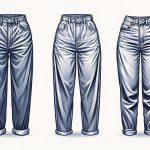We’ve all seen the commercials: A dad places a shirt in the washing machine, only to pull it out later and find it completely ruined. His daughter then hands him a bottle of fabric softener and tells him to use it next time.
The implication is clear: If you want your clothes to last longer; you need to use fabric softener. But is that really true? Let’s take a closer look.
Key Summary
Fabric softener can extend the life of your clothes, but the results vary depending on the type of softener you use. It can help reduce friction between fibers, making your clothes last longer and reducing static cling. However, some types of fabric softener can actually damage your clothes, so it’s important to choose the right one for your needs.
The answer isn’t quite so simple. While fabric softener can certainly help prolong the life of your clothes, there are a number of factors that play into how long your clothes will actually last.
For example, the type of fabric your clothes are made from makes a big difference. Delicate fabrics like silk or wool are going to break down faster than tougher fabrics like denim or canvas.
And even within each fabric category, there can be a wide range of quality. A cheap t-shirt made from low-quality cotton is going to fall apart faster than a well-made pair of jeans, even if they’re both made from denim.
In addition to the fabric itself, how often you wear and wash your clothes also makes a difference. Clothes that are worn frequently will inevitably break down faster than those that are only worn occasionally.
And if you wash your clothes too often, that can also shorten their lifespan. Washing them in hot water and/or putting them in the dryer will cause them to degrade even faster.
So, does fabric softener really make clothes last longer? The answer is yes… but only to a certain extent. If you have high-quality clothes made from tough fabrics, using fabric softener can help prolong their lifespan. However, if you have delicate clothes or cheap clothes made from low-quality materials, they’re going to break down relatively quickly no matter what you do.
In those cases, it might be better to just enjoy them while you can and not worry about trying to make them last forever.
Table of Contents
What Does Fabric Softener Do to Clothes?
Fabric softener is a product that is used to make clothes feel softer and smell fresher. It is applied to clothes after they have been laundered and can be done so by either spraying it on, or adding it to the wash cycle. Fabric softener works by coating the fabric with a thin layer of lubricant, which makes the fabric feel softer and smell fresher.
Not only does fabric softener remove lint and other debris from clothing, but it can also make ironing much easier. Some types of fabric softener will coat fabrics with a layer that repels water and stains—keeping your clothes looking new for longer.
However, it’s important to note that not all fabric softeners are created equal. Some types of fabric softener can actually damage your clothes, so it’s important to choose the right one for your needs.
For example, some fabric softeners contain chemicals that can break down specific type of fabrics like spandex or Lycra. Others may contain fragrances that can cause skin irritation or trigger allergies.
What Are the Best Ways to Make Your Clothes Last Longer?
Your clothes are an investment. You want them to last as long as possible so you can get the most wear out of them. But how can you make your clothes last longer?
These tips will help you extend the life of your clothes so you can keep wearing them for years to come.
Choose Quality Clothes
The best way to make your clothes last longer is to buy quality clothes in the first place. Clothes that are well made from high-quality materials will last longer than cheaply made clothing. It’s worth spending a little extra on quality pieces that will stand the test of time. You’ll save money in the long run because you won’t have to replace them as often.
You Don’t Need to Wash Your Clothes as Often as You Might Think
You might think that washing your clothes more often will make them last longer, but that’s not necessarily true. Washing your clothes too often can actually shorten their lifespan. Every time you wash your clothes, they slowly start to degrade. So unless they’re visibly dirty or smelly, try to wash them less often. You can spot clean them in between washes to keep them fresh.
Hand Wash Your Clothes in Order to Keep Them Looking Their Best
When you do wash your clothes, hand washing is always the best option. It’s gentler on fabric than machine washing, so it will help your clothes last longer. Plus, handwashing is better for delicate items like silk and wool. If you don’t have time to hand wash, be sure to use the delicate cycle on your washing machine and cool water instead of hot.
Use Environmentally Friendly Laundry Detergent
Another way to extend the life of your clothes is to use environmentally friendly laundry detergent. Regular laundry detergent is harsh on fabric and can cause fading and damage over time. Eco-friendly laundry detergent is gentle on fabric and helps preserve color and shape. It’s also better for the environment, which is an added bonus.
Let Your Clothes Air Dry
Line drying is another great way to make your clothes last longer. The heat from a dryer can shrink fabrics and damage delicate materials. If you must use a dryer, be sure to set it to the lowest heat setting. Better yet, invest in a drying rack and let your clothes air dry.
When Is It Inappropriate to Use Fabric Softener?
Fabric softener is a common household item found in most laundry rooms. It is used to soften fabrics and make them feel smoother to the touch. However, there are some cases where using fabric softener is not recommended.
Microfiber. What’s great about microfiber is that its intricate threads have the ability to trap dust and absorb spills. However, those same intricate threads can also become clogged with fabric softener residue, which will reduce the fabric’s ability to do its job. For this reason, it’s best to avoid using fabric softener on microfiber clothes.
Sportswear. Most sportswear are made from synthetic fabrics like polyester and nylon. These fabrics are designed to wick away sweat and moisture, which helps keep athletes cool and dry.
However, fabric softener can coat these fabrics and prevent them from doing their job properly. In addition, fabric softener can also cause Static cling.
Yup, that annoying cling that happens when you take your clothes out of the dryer? That’s caused by fabric softener! So if you want to avoid static cling, it’s best to steer clear of fabric softener when laundering your workout gear.
Towels. One of the main functions of towels is to absorb water—and lots of it! But if towels are coated in fabric softener residue, they won’t be able to do their job as effectively. In addition, using fabric softener on towels can also make them less absorbent over time. If you want your towels to last longer and perform at their best, it’s best to avoid using fabric softener altogether.
Flame-resistant clothing. Flame-resistant clothing is typically made from synthetic materials like nylon and polyester. These fabrics are treated with chemicals that make them resistant to fire—but those same chemicals can be stripped away by fabric softener residue. As a result, it’s important to avoid using fabric softener on flame-resistant clothing.
Water-repellent fabric. Water-repellent fabrics are designed to repel water—but you guessed it, fabric softeners can strip away the water-repellant properties of these fabrics over time! So if you want your raincoat or snow pants to work properly, skip the fabric softener and opt for air drying instead.
The next time you’re doing a load of laundry, take a moment to consider what type of fabric you’re washing before reaching for the bottle of fabric softener. By understanding which fabrics are best suited for fabric softening and which ones aren’t, you can help extend the life of your clothing—and save yourself a little money in the process!
- How Does Ring Spun Cotton Affect Garment Fit and Shape Retention? - August 13, 2024
- What Are the Challenges in Producing Ring Spun Cotton? - August 13, 2024
- Is Ring Spun Cotton Suitable for Plus-Size Clothing? - August 13, 2024






